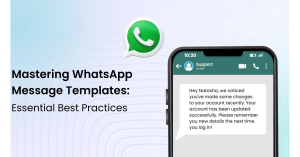
Why WhatsApp is a Game-Changer for Customer Communication
Modern consumers expect seamless, real-time interactions with businesses. With users spending over 16 hours per month on WhatsApp, it has become more than just a messaging app—it’s a powerful tool for brand engagement, customer support, and even sales.
Today, shoppers don’t just receive updates from businesses on WhatsApp; they actively start conversations, ask questions, and complete purchases—all within the app. This shift to two-way communication gives customers control, enabling them to reach out when they need support or information, rather than waiting for delayed email responses or long call queues.
Understanding WhatsApp Conversational Messaging
WhatsApp conversational messaging allows businesses and customers to interact in real-time. These conversations can be customer-initiated (e.g., inquiries, complaints, purchase queries) or business-initiated (e.g., appointment reminders, order updates, promotions).
For example, a customer can respond instantly to an appointment reminder to reschedule or ask for more details. A retailer can send product recommendations based on past purchases, streamlining the shopping experience.
The Power of WhatsApp Conversational Messaging
Strong customer relationships drive business success, and WhatsApp plays a crucial role in fostering these connections. Studies show that over 50% of consumers prefer texting or messaging apps over traditional communication channels when engaging with brands. Additionally, 83% of shoppers say they feel more confident in a brand that offers messaging support.
Fast response times are key—customers prefer WhatsApp because it enables quick, convenient, and efficient communication. Younger demographics, in particular, favor messaging because it allows them to pause and resume conversations at their convenience.
By adopting WhatsApp as a communication tool, businesses can increase customer satisfaction, drive sales, and enhance brand loyalty.
The Future of WhatsApp for Business
WhatsApp’s influence continues to grow, with over 3 billion active users worldwide. As its business API evolves, companies are leveraging WhatsApp to drive engagement and improve customer experience.
Consumers are increasingly comfortable interacting with brands via messaging. A recent study found that 93% of U.S. shoppers are open to receiving texts from brands—up from 81% the previous year. Popular message types include:
- Order updates and shipping notifications
- Personalized promotions
- Special occasion greetings
- Customer support responses
Additionally, 63% of consumers interact with brands via messaging at least twice a week, reinforcing WhatsApp’s effectiveness as a customer engagement tool.
Key Benefits of WhatsApp Conversational Messaging
1. Higher Engagement & Conversion Rates
WhatsApp boasts an impressive 98% open rate—far exceeding email or SMS. Businesses can use this advantage to send personalized promotions, interactive messages, and rich media content to boost engagement.
Compared to other digital channels, WhatsApp drives 72% more customer sessions per year and sees an 89% increase in purchase conversions per user.
2. Instant, Convenient Communication
With 24/7 availability, WhatsApp reduces friction in customer interactions. Businesses can quickly handle inquiries, process orders, and resolve issues, improving overall customer experience.
For example, financial institutions use WhatsApp for fraud alerts, allowing customers to respond immediately—enhancing both security and convenience.
3. Rich Media & Interactive Messaging
Unlike traditional SMS, WhatsApp supports multimedia elements such as images, videos, voice messages, and interactive buttons. Businesses can:
- Send high-quality product images to drive sales
- Deliver event tickets and boarding passes digitally
- Provide instructional videos for onboarding
- Automate service reminders
4. AI-Powered Automation for Seamless Support
Smart automation allows businesses to offer instant, yet personalized responses. AI-driven chatbots can:
- Answer FAQs
- Qualify leads and guide purchase decisions
- Schedule appointments
- Provide tailored product recommendations
CRM integrations further enhance these interactions, ensuring a smooth customer journey.
Best Practices for WhatsApp Business Messaging
1. Secure Customer Consent
Since WhatsApp is a private messaging platform, businesses must obtain opt-ins before sending messages. Ways to encourage opt-ins include:
- Offering sign-ups when collecting customer phone numbers
- Running click-to-WhatsApp ads on Facebook and Instagram
- Adding an opt-in checkbox at checkout or during account registration
Always provide an easy opt-out option to maintain transparency and trust.
2. Personalize Customer Interactions
Leverage customer data to create meaningful interactions:
- Send personalized product recommendations
- Offer exclusive discounts based on past purchases
- Use emojis, GIFs, and stickers to add a human touch
3. Implement a WhatsApp Chat Widget
Adding a WhatsApp chat button to your website simplifies communication. Benefits include:
- CRM integration for centralized messaging
- Chatbot templates for automation
- Shared inboxes for efficient support team collaboration
4. Utilize WhatsApp’s Business Features
Maximize engagement using WhatsApp’s business tools:
- Verified Business Profiles: Build credibility with a verified badge.
- Template Messaging: Send pre-approved messages beyond the 24-hour window.
- Interactive Messaging: Use quick replies, list menus, and call-to-action buttons.
- End-to-End Encryption: Ensure secure and private communication.
- Shared Team Inbox: Allow multiple agents to manage conversations efficiently.
Challenges in WhatsApp Marketing & How to Overcome Them
Despite its advantages, businesses may face challenges such as:
- Technical Complexity: API integration requires expertise.
- Consumer Behavior Insights: Understanding optimal messaging times is crucial.
- Tone Balance: Striking the right mix of professional yet friendly messaging can be tricky.
- Measuring ROI: Implementing analytics tools is necessary to track engagement and optimize campaigns.
How to Get Started with WhatsApp Business Messaging
To unlock the potential of WhatsApp messaging, businesses should:
- Set up a WhatsApp Business API account.
- Integrate WhatsApp with CRM and customer service tools.
- Use website widgets, QR codes, and social media ads to drive WhatsApp traffic.
- Implement automation and chatbots for scalable customer interactions.
- Launch marketing campaigns through WhatsApp broadcasts and ads.
Final Thoughts
WhatsApp conversational messaging is transforming customer engagement. With its widespread reach, real-time interaction capabilities, and personalization potential, businesses can create more meaningful relationships with their audience.
Companies that strategically integrate WhatsApp into their marketing and customer service efforts will gain a competitive edge—boosting engagement, conversions, and long-term loyalty.
Now is the time to embrace WhatsApp as a key component of your business strategy and start delivering superior customer experiences.

